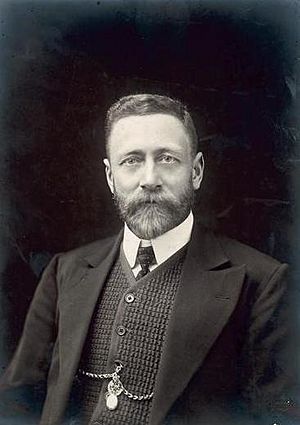Albert Palmer (Australian politician) facts for kids
Quick facts for kids
Albert Palmer
|
|
|---|---|
 |
|
| Member of the Australian Parliament for Echuca |
|
| In office 12 December 1906 – 14 August 1919 |
|
| Preceded by | James McColl |
| Succeeded by | William Hill |
| Personal details | |
| Born | 1859 Melbourne, Victoria |
| Died | 14 August 1919 (aged 59–60) |
| Nationality | Australian |
| Political party | Anti-Socialist (1906–09) Liberal (1909–17) Nationalist (1917–19) |
| Occupation | Grazier |
Albert Clayton Palmer (born 1859 – died 14 August 1919) was an important Australian politician. He served in the Australian House of Representatives, which is a main part of Australia's parliament. He represented the area called Echuca. He was a member of different political parties during his time, including the Anti-Socialist Party, the Commonwealth Liberal Party, and the Nationalist Party.
Contents
Early Life and Work
Albert Palmer was born in 1859 in Collingwood, a suburb of Melbourne. Later, he moved to Euroa with his father and brother. His father bought a flour mill there.
When his father passed away, Albert and his brother took over the mill. They ran the business together as "Palmer Brothers." Albert also had interests in grazing, which means raising livestock like sheep or cattle.
Community Involvement
Albert Palmer was active in his local community. He was a councillor for the Shire of Euroa from 1888 to 1893. This meant he helped make decisions for the local government.
He was also involved with the Australian Natives Association. This group worked to promote Australian identity and interests. Albert was a strong supporter of the Federation. This was the process of joining Australia's separate colonies into one country.
Reform Movements
Albert Palmer became a leader in several important groups. These groups wanted to make changes in politics. From 1901 to 1902, he was a leader and the second president of the Kyabram Reform Movement. This group from rural areas wanted to reduce the number of politicians in the state parliament.
In 1902, he became the president of the National Citizens Reform League. This shows he was dedicated to political reform.
Religious and Social Beliefs
Albert Palmer was also a lay Methodist preacher. This means he gave sermons in church but was not a full-time minister. He was also a Sunday school superintendent, teaching children about religion.
He strongly believed in temperance, which means avoiding alcohol. He was also a key member of the Loyal Orange Institution and the Protestant Federation. These were religious and social organizations.
Political Career
Albert Palmer first tried to enter federal politics in 1903. He ran for the Moira seat in the federal election but was not successful.
Entering Parliament
In 1906, Albert Palmer was elected to the Australian House of Representatives. He won the seat of Echuca. He ran as a candidate for the Anti-Socialist Party. He narrowly defeated the previous member, Thomas Kennedy.
This election result was challenged. The Court of Disputed Returns declared it void, meaning it was cancelled. However, Palmer won the next election, called a by-election, more easily.
Party Changes and Policies
Albert Palmer's Anti-Socialist Party later joined with the Commonwealth Liberal Party in 1910. Then, in 1917, the Liberal Party merged into the Nationalist Party. So, he was part of different major political parties during his time in parliament.
He started as a "free trader," which means he supported fewer taxes on goods coming into the country. Over time, he became a "moderate protectionist." This means he supported some taxes on imported goods to help local industries.
Palmer believed that voters should have a say before politicians received a pay raise. He held his seat in parliament until he passed away in 1919. He died from pneumonia.
 | Selma Burke |
 | Pauline Powell Burns |
 | Frederick J. Brown |
 | Robert Blackburn |

